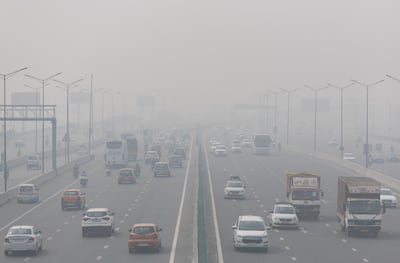Authorities barred diesel vehicles from entering India's capital Delhi on Friday, as air pollution levels remained “severe” for a second day.
The ban affects all diesel vehicles that do not comply with the BS-VI emissions standard, which is equivalent to the Euro 5 benchmark.
All construction activity in Delhi was stopped, primary schools were closed and outdoor activities for pupils in higher grades were restricted as a grey haze engulfed the city of 22 million.
Many people wore face masks, or covered their faces with scarves and handkerchiefs.
The Central Pollution Control Board said Delhi’s Air Quality Index was in the “severe” range again on Friday with levels of PM2.5 measuring at 450 — well past the global safe limit.
Doctors say that PM2.5 — dust and other harmful particles measuring less than 2.5 microns — can penetrate deep into the lungs and enter the bloodstream, causing respiratory and cardiac diseases.
The World Health Organisation considers 5 micrograms per cubic metre as the safe level of exposure to particulate pollution.
In separate announcements, the Delhi administration on Friday asked tens of thousands of its employees to work from home as it also regulated market timings.
The Commission for Air Quality Management, a panel that monitors Delhi and adjoining cities, announced the traffic and construction restrictions late on Thursday after levels of toxins in the air surged in the capital.
Only diesel lorries carrying essential commodities and diesel passenger cars are allowed to operate in Delhi and its satellite cities.
It also shut all industries running on fuels except dairies and units manufacturing medical equipment or drugs.
Delhi is ranked the world's most polluted capital city and pollution levels surge every winter.

Vehicles and industries are major emitters throughout the year, but widespread fires on farms across northern India, as farmers burn crop residue to clear their fields for the next crop, add to Delhi's air pollution woes during winter.
On Wednesday, Punjab state recorded more than 3,600 farm fire incidents, the highest number this season.
The air pollution crisis has historically caused a war of words between the Delhi regional government led by Arvind Kejriwal and the federal government led by Prime Minister Narendra Modi.
Federal Environment Minister Bhupender Yadav on Thursday blamed farm fires in Punjab for turning Delhi into a “gas chamber”.
Mr Kejriwal on Friday morning took responsibility for the farm fires but also asked Mr Modi’s government to come forward and help.
“This is not the time to do politics,” he said. “We will make sure that no child’s health is affected.”
He also said his government was considering implementing the odd-even traffic scheme, first introduced in 2016, that allows only vehicles with odd or even-numbered registration plates onto the roads on alternate days.
Experts at Delhi-based Centre for Science and Environment, a non-profit group, said vehicle emissions contributed half of the pollutants responsible for the toxic air quality.
“Delhi has 14 million vehicles and if you take it into the national capital region, vehicle emission would be huge. When we looked at the local sources, we found that 50 per cent of PM 2.5 is contributed by vehicles,” Vivek Chattopadhyay, principal programme manager at CSE’s Clean Air and Sustainable Mobility, told The National.
In a recent report, the CSE said data suggested the daily contribution of PM 2.5 from vehicles ranged between 49.3 per cent and 53 per cent during the week of Diwali.

Mr Chattopadhyay said temporary measures such as preventing stubble-burning and the odd-even traffic scheme were futile and the pollution problem needed a long-term approach
“Punjab, Haryana and Uttar Pradesh have several sources including industries and stubble burning. But farm fires cannot be doused overnight,” he said.
“Public transport needs to be improved in the city, all modes of transport should be considered well in advanced. We have to act year-long and find solutions for all sources and approach the issue sector-by-sector."
A Supreme Court bench headed by Chief Justice Uday Lalit will hold an urgent hearing on the pollution crisis on November 10 after a fresh petition for the court’s intervention was filed on Friday.
The top court last November had proposed a total lockdown in New Delhi, including the closure of all schools. It also criticised both the Delhi and federal governments and told them to come up with measures to combat industrial and vehicular pollution.










